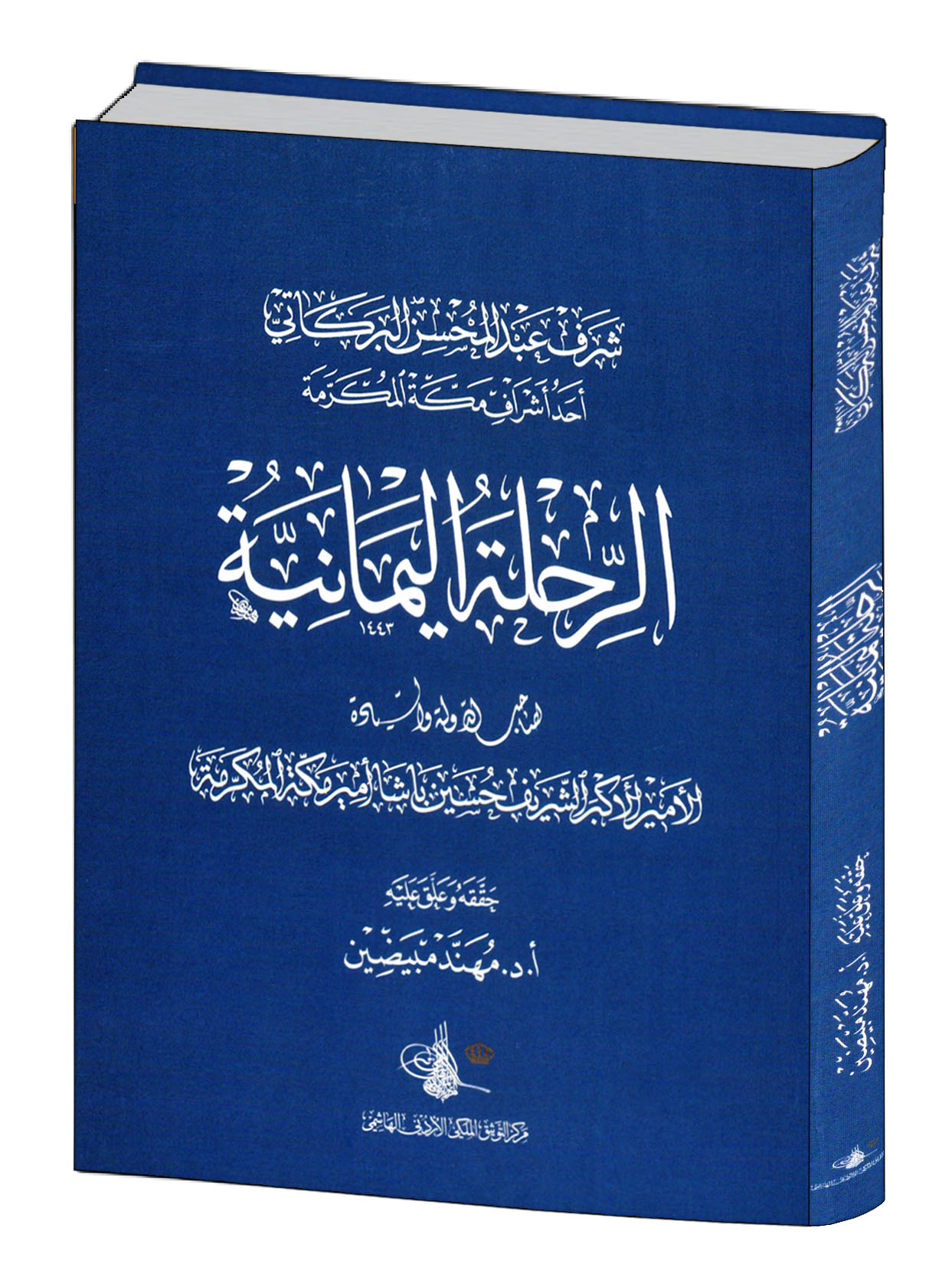Al-Rihla al-Yamaniyya li-Sa'hib ad-Dawla al-Amir al-Akbar, Sharif Hussein Pasha, Amir Makka al-Mukarrama
 The Yemeni Journey of His Excellency, the Grand Prince, Sharif Hussein Pasha, Prince of Mecca
The Yemeni Journey of His Excellency, the Grand Prince, Sharif Hussein Pasha, Prince of Mecca
Authored by Sharaf Abdulmohsen Al-Barakati, one of the Notables of Mecca
Reviewed and annotated by Professor Dr. Muhannad Mubaideen
In his book, Sharif Sharaf bin Abdulmohsen Al-Barakati documents the journey undertaken by Sharif Hussein bin Ali, the Prince of Mecca, in 1911 at the request of the Ottoman State. This journey aimed to mend the rift in Asir and preserve the prestige of the nation-state, to end its internal strife, and to halt Western powers' interference in the region. This book demonstrates Sharif Hussein's commitment to defending the Caliphate and the Muslim lands during an era marked by Western intervention in the Arab East and North Africa, as the new wave of colonialism began its long course, leading the region and the Ottoman State towards further disintegration.
The narrative of the journey is presented in simple language, focusing on the realistic, direct recounting of the journey's path, as chronicled and documented by Al-Barakati according to his lived experiences. It includes details of the military campaign and its developments, along with descriptions of the geographical landscape. Al-Barakati's use of various time-related terms to indicate days, hours, moments, and dates reflects an awareness of historical documentation. The journey provides significant information about the economic life, including descriptions of fruits, types, agriculture, crops, and other goods traded in the markets. The author also describes the geography of the Areas traversed, including mountains, valleys, water sources, and administrative divisions of some areas. Al-Barakati mentions the names of the Sheriff’s military leaders, scholars, and tribes who accompanied the campaign, including their lineages. The book is structured into 17 chapters, listed as follows according to their appearance in the original text:
- The lineage of the Idrisi, his birth, origin, and his role in igniting this strife.
- Detailed account of the auspicious journey of His Excellency Prince Hussein Pasha, Prince of Mecca, to extinguish this strife and the fate of the Idrisi and his soldiers, including a detailed description of the tribes of Tihamah, Hejaz, and the lands of the Two Holy Mosques.
- The state of the Idrisi after the return of His Excellency, the Prince of Mecca, from his campaign.
- Description of the Arabian Peninsula.
- The first part... the lands of Yemen.
- The governorship of Asir.
- The geography of Asir.
- The province of Hejaz.
- The southern boundary of the province.
- Wadi Fatimah.
- The lands of Hadhramaut.
- The lands of Oman, also known as the Imamate of Muscat.
- The Bahrain Islands.
- The lands of Najd.
- The tribes of Shammar.
- The lands of Al-Aridh.
- The province of Basra and Baghdad.
The author, Sharif Sharaf bin Abdulmohsen bin Hazem Al-Barakati of the Hussein family lineage, accompanied Sharif Hussein bin Ali on the military campaign to Asir in the year 1330 AH/1911 AD. He was appointed Qaimmaqam (district governor) of the Emirate of Mecca in 1335 AH/1916 AD, later becoming the delegate and agent of the Arab Hashemite Agency in Cairo in 1337 AH, and then deputy of the foreign agency following Prince Abdullah bin Hussein's resignation from the foreign agency in 1338 AH/1920 AD. Under King Abdulaziz, he was appointed head of the Administrative Monitoring Authority in 1349 AH/1930 AD. He passed away, may God have mercy on him, on Wednesday, 25 Shawwal 1358 AH/1939 AD.
The authenticator of the book is Professor Dr. Mohanned Mubaideen, a professor of modern history and the General Director of the Royal Jordanian Hashemite Documentation Center, as well as the Dean of the Faculty of Arts at the University of Jordan. He has authored numerous works and studies focusing on the history of the Arabs during the Ottoman Empire.
The publications from the Hashemite Documentation Center are not translated into English. Institutions and publishing houses interested in publishing a translated version should contact the center at the following email address: Info@rhdc.jo. This offers an opportunity for broader access to these valuable historical resources for non-Arabic speaking audiences and researchers